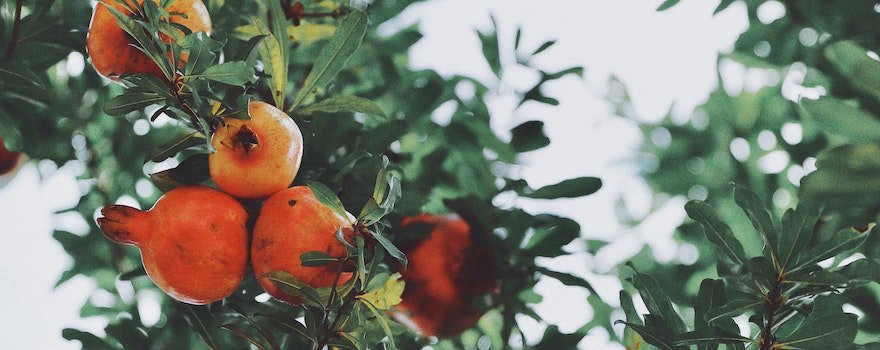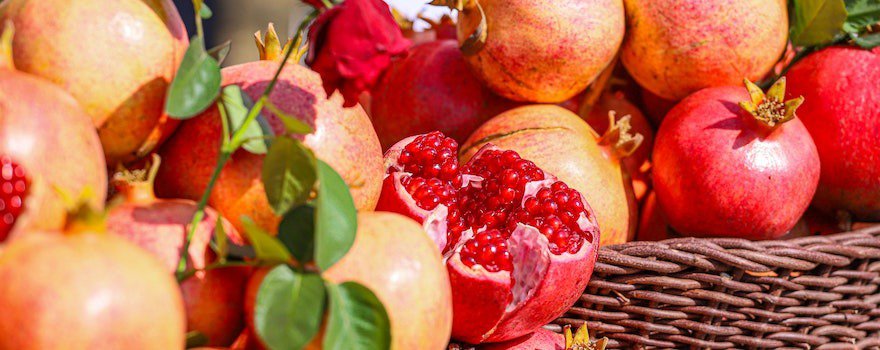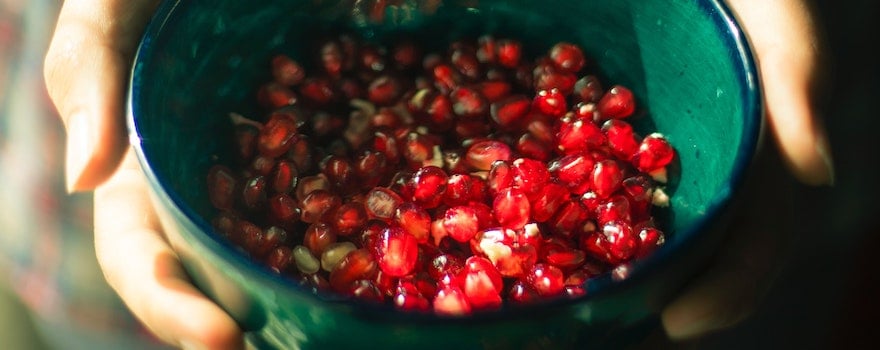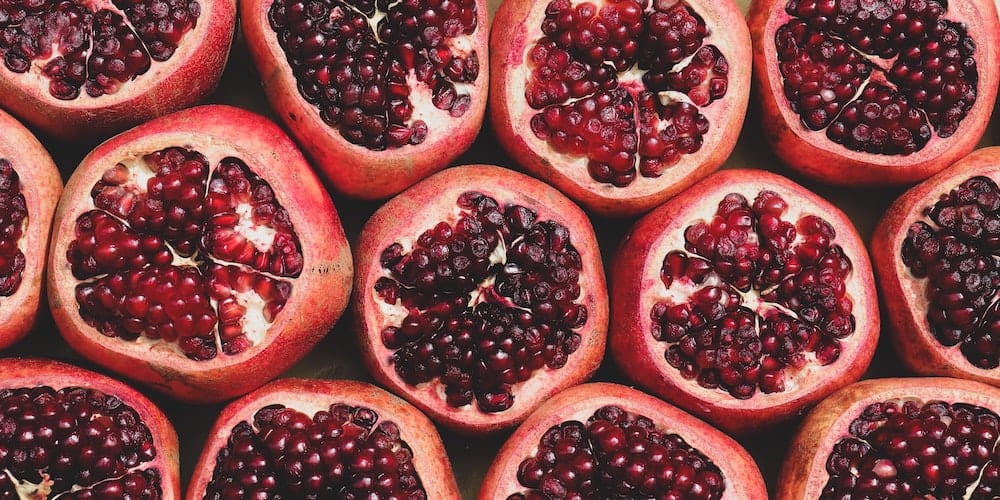BENEFITS OF POMEGRANATE
✓ Boosts immunity
✓ Source of antioxidants
✓ Anti-inflammatory
✓ Fights bacteria
✓ Potentially anti-cancer
What is pomegranate?
The pomegranate is the fruit of the pomegranate tree (Punica granatum), a shrub typical of the Mediterranean regions. It is also found in China and South America (Chile, Argentina…). This fruit resembles an apple with a diameter ranging from 10 to 15 cm. Initially green, it takes on a beautiful reddish-orange color once it matures.
Each pomegranate can contain up to 400 seeds (or arils), enclosed in thick “compartments”. This is where it draws its Latin name “granatus“, which means “with many seeds”.
Humans have consumed this fruit for centuries. The earliest traces of its introduction date back to Egypt, around 1600 BC. It then traversed the centuries, regarded as a symbol of life, rejuvenation, and a sacred fruit by many populations: Greeks, Romans, Assyrians…
Read also | Dany’s Pomegranates: between tradition and innovation in the province of Alicante
Today, the pomegranate interests researchers because of its many medicinal properties. In addition to boosting the immune defenses, it exerts an antioxidant, anti-inflammatory, and antibacterial action. It also shows promising anti-cancer effects. In cosmetics, it is regularly found in anti-aging products.
Nutritional composition
- Amino acids
- Vitamins: B3, B5, B6, B9, C, E, K
- Minerals and trace elements: potassium, phosphorus, magnesium, zinc, iron, calcium, sodium
- Proteins
- Carbohydrates
- Fibers
- Antioxidant actives: punicalagins, flavonoids, anthocyanins
- Fatty acids: punicic acid, omega-6

The benefits of pomegranate
🛡 Boosts immunity
With 20 mg per 100 g, the pomegranate is an excellent natural source of vitamin C or ascorbic acid. Thus, it ranks ahead of many fruits like persimmon, pineapple, blueberry, or clementine.
Consuming this Mediterranean fruit helps energize and boost immune defenses. The body is strengthened and better able to fight infections, especially in winter. It also contains other vitamins that support immunity such as vitamin E, which preserves the immune system.
This review from the University of Belgrade (Serbia) informs us about the composition of pomegranate and notably its vitamin C content.
🥝 Source of antioxidants
Because it contains a great amount of vitamin C and E, pomegranate is also antioxidant: it helps combat free radicals that damage cells and accelerate aging.
But it also contains valuable antioxidants such as punicalagins. These tannins, present in the skin and juice of the pomegranate, are particularly effective at neutralizing free radicals and inhibiting oxidative stress.
This study from the University of Washington School of Medicine (United States), conducted on pregnant women, shows how pomegranate’s punicalagins reduce oxidative stress.
🔥 Anti-inflammatory
Pomegranate possesses anti-inflammatory properties that help relieve numerous pathologies, including chronic ones: heart disorders, osteoarthritis, rheumatoid arthritis, diabetes, neurodegenerative diseases…
Once again, it’s the punicalagins that drive this action. They suppress the activation of NF-κB, a protein involved in the inflammatory response, and inhibit the activity of pro-inflammatory cytokines (interleukins 6 and 8).
This study from Shahid Beheshti University (Iran), conducted on diabetic patients, shows the anti-inflammatory activity of pomegranate juice.
🦠 Fights bacteria
Pomegranate has antibacterial action. It is thus capable of fighting numerous pathogenic bacteria such as Staphylococcus aureus, Escherichia coli, or Listeria monocytogenes. This action is attributed to the phenolic compounds and flavonoids it contains.
It also exerts an anti-biofilm activity by preventing bacterial adherence to mucous membranes and tissues.
This study from the Federal University of Minas Gerais (Brazil), conducted directly in the laboratory, shows how pomegranate fights against the Staphylococcus aureus bacteria.
🔬 Potentially Anti-Cancer
In various studies, pomegranate has shown promising anti-cancer effects. Its potentials have been studied in breast, colon, lung, skin, and prostate cancers.
This is due to its powerful antioxidant activity and its richness in anthocyanins, ellagitannins, and tannins. It slows the growth of cancer cells and induces apoptosis (programmed cell death).
This review from the University of Alabama at Birmingham (USA) highlights the anti-cancer potential of pomegranate.

How to Eat Pomegranate?
Fresh Pomegranate
The pomegranate harvest extends from September to December. It is during this period that you are most likely to find fresh pomegranates in stores.
Only the seeds are edible. To de-seed your fruit, cut it into quarters, remove the skin, and then remove the seeds, being careful to take off the membrane surrounding them. You can also proceed as shown in the video below, a less messy option that requires more dexterity!
Seeds can be consumed as they are or added to salads, fruit mixes, rice, vegetable dishes…
Fresh fruit can be stored for several weeks in the refrigerator. But the seeds degrade fairly quickly, so it’s better to freeze them if you don’t consume them right away.
Pomegranate Juice
Pomegranate juice is often available in stores. It is a refreshing drink, both sweet and tart. Make sure it is pure juice, then dilute it with water or another juice if desired.
If you have a press or a juice extractor, you can easily prepare your own homemade pomegranate juice. To do this, extract the seeds and blend them with some sugar, honey, or lucuma powder.
Dried Pomegranate Seeds
You can find dried pomegranate seeds in specialty and organic stores. They can be enjoyed plain or mixed in cereals, salads, yogurts, or pastries. They pair wonderfully with goji berries or açai, mulberries, cranberries…
Consume Sustainably: Favor Organic, Local, and Fair-Trade Pomegranates
✓ Today, pomegranate is primarily cultivated in North Africa: Tunisia, Turkey, Morocco, Egypt… However, due to rising demand, some producers have revived pomegranate cultivation in France, such as in the Gard region, which benefits from a favorable climate.
✓ If possible, choose French-origin pomegranates grown using organic farming. Also favor fruits harvested in the context of fair trade to support the work of small producers.
✓ Excellent varieties are also found in Spain.

Dosage
There is no specific recommended dosage for pomegranate seeds, which can be consumed throughout the day (but in moderation). In juice form, it is recommended to drink between 250 to 300 ml per day.
Contraindications and Side Effects
Pomegranate consumption presents certain contraindications:
- Due to its high fiber content, individuals with sensitive or irritated intestines should consume it in moderation;
- Pomegranate juice is very rich in fructose and should therefore be consumed sparingly by people with diabetes;
- Because of its effect on blood pressure, individuals with low blood pressure should avoid consuming it;
- Pomegranate may interact with certain medications (anticonvulsants, anti-inflammatories, antidepressants, pain relievers…).
Excessive consumption of pomegranate has certain side effects:
- Digestive disorders
- Nausea
- Vomiting
- Abdominal pains
- Diarrhea
- Allergic reaction
If you experience side effects, stop consuming and consult a doctor.
History, Culture, and Market of Pomegranate

The demand for pomegranates is rapidly increasing worldwide. Some producing regions are recognized for the quality of their fruits, such as Ouled Abdellah in Morocco.
It also benefits from a Protected Geographical Indication (PGI) for its Sefri variety and organizes the annual pomegranate festival that highlights the importance of the pomegranate tree for this region and local producers.
Compiled by Julia Perez
Sources and scientific studies
Yardena Arnoni, Elliot M. Berry, 2015. On the Origins and Evolution of the Mediterranean Diet.
Vesna Vučić, Milkica Grabež, Armen Trchounian, Aleksandra Arsić, 2019. Composition and Potential Health Benefits of Pomegranate: A Review.
Baosheng Chen, Methodius G Tuuli, Mark S Longtine, Joong Sik Shin, Russell Lawrence, Terrie Inder, D Michael Nelson, 2012. Pomegranate juice and punicalagin attenuate oxidative stress and apoptosis in human placenta and in human placental trophoblasts.
Golbon Sohrab, Javad Nasrollahzadeh, Hamid Zand, Zohreh Amiri, Maryam Tohidi, and Masoud Kimiagar, 2014. Effects of pomegranate juice consumption on inflammatory markers in patients with type 2 diabetes: A randomized, placebo-controlled trial.
Pooja Sharma, Sarah F McClees, Farrukh Afaq, 2017. Pomegranate for Prevention and Treatment of Cancer: An Update.



